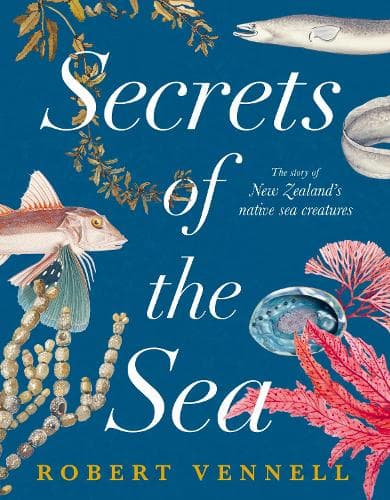Review: Secrets of the Sea: The Story of New Zealand's Native Sea Creatures
Reviewed by Alex Eagles
Secrets of the Sea is the evocative title of ecologist and natural history writer Robert Vennell's new book and a very apt description of our oceans. With an astonishing 80 per cent still unexplored and 70 per cent of species yet to be classified, the Earth's seas are full of mystery.
In the preface, Vennell eloquently sets the scene for his book: ‘Hidden beneath the waves are some of the most fascinating and unique creatures in New Zealand, all with remarkable stories to tell....’
I can vividly remember the first time I went snorkelling as a child, being absolutely intrigued by the world beneath the waves. That enthral is just as strong today, so I thoroughly enjoyed learning new facts about some of our most beguiling marine life.
Fans of Vennell's first book, The Meaning of Trees, who enjoyed the plethora of facts found throughout the luxuriantly thick pages, will find more of the same in his latest offering. Secrets of the Sea: The story of New Zealand's native sea creatures is a wonderful mix of historical records, including amusing anecdotes and amazing accounts, up-to-date scientific research, Māori lore and mātauranga - all cleverly blended together in Vennell's extremely readable style.
Vennell says the inspiration for this book came after he was fortunate enough to join an expedition to the Poor Knights, an area pioneering marine biologist Jacques Cousteau famously described as one of the top diving sites in the world. Working as a curator of Natural Sciences at the Auckland Museum, Vennell admits he was in the perfect place "to dive into the archives" and surface with facts and stories that have long been buried and all but forgotten.
He especially enjoyed old newspaper articles. Some of the more bizarre stories he came across concerned octopus/wheke, which early European settlers called the 'devil fish' and greatly feared. As Vennell reiterates, octopuses are extremely intelligent animals and excellent mothers.
A historical note I was particularly fascinated to read was how early Māori wove flax nets a kilometre long, 10m deep and weighing several tonnes. According to Vennell, these colossal creations took a whole community to haul from the sea and could yield ‘tens of thousands of fish in a single sweep.’ Joseph Banks once commented that Māori in the Bay of Islands laughed openly at the small nets used by the crew of the Endeavour.
Secrets of the Sea covers 32 creatures from freshwater and estuarine habitats, rocky and sandy shorelines, as well as ocean roamers and denizens of the deep. Historical photos and illustrations from museum collections are cleverly inserted throughout the text alongside incredible quality colour photos, which all add immensely to each section. My favourite is a stunning image of a banded kōkopu. However, the black and white images of days gone by are precious snapshots of how the world once was – and I am grateful to now have on my bookshelf.
At times, Secrets of the Sea will make you laugh out loud with proverbs like this one about our little freshwater mussel: ‘A man drowsing in the house, smack his head; a man skilled in dredging kākahi, marry him.’
Other sections will make you shudder with tales of lamprey sucking the blood from whales and the slimy feeding frenzy of hagfish. You may get tears in your eyes reading about the extinction of the Upokorokoro, the New Zealand grayling, but smile when hearing about the successful translocation of toheroa and the hope for the shellfish's future. Historical mistakes (often because people didn't know any better) will probably make you shake your head, while mātauranga Māori management techniques can give us all food for thought, regardless of ancestry.
Reviewed by Alex Eagles
